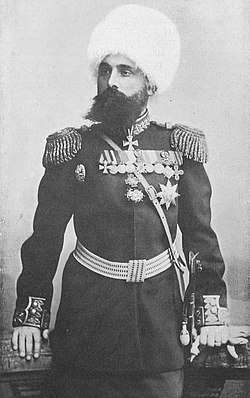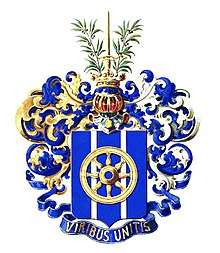Dejan Subotić
Dean Ivanovich Subotich (also spelled Dejan Subotić and Dean Subbotich; 7 May 1852 - 1920) was a Russo-Serbian military and state leader, military governor of Russian Dalian (Primorye oblast; 1897-1898);[1]Transcaspian Oblast (Zkaspiyskaya oblast, 1901-1902),[2] general governor of Primorsky Krai (1902-1903),[3] Military ataman of the Ussuri Cossack Host, Governor General of Amur Oblast (1903-1905)[4] and Turkestan (1905-1906).[5][6]

Dean Subotich was the son of the well-known Serbian poet Jovan Subotić.
Serbian-Turkish War
Dean Ivanovich Subotich was born in Vienna, Austrian Empire on 7 May 1852. He graduated from high school in Austria, and in 1867 joined the Russian military service in St. Petersburg. There he was educated at the Second Konstantinovsky Military Academy where he received the rank of second lieutenant and appointed to the guards. From 1871 to 1874 he was enrolled at the prestigious His Imperial Majesty Nicholas General Staff Academy and the Naval Cadet Corps.
Upon graduation, he was sent to the artillery brigade of the Caucasian Grenadier Division of Grand Duke Mikhail Nikolayevich and promoted to lieutenant on 13 April 1875.
The following year he went to warring Serbia, to the headquarters of the Timok-Moravian army under the command of General Mikhail Chernyayev. According to Russian sources, he participated in a series of battles against the Turks, and on 5 February 1877, he was promoted to the rank of captain.
In early spring of 1877, Subotich was re-enlisted in the Kiev Military District. Then, in September 1885, he became Chief of Staff of the 15th Infantry Division in Odessa, and from 6 March 1889 to 11 January 1893, he was again on duty in the Caucasian Grenadier Division in Tbilisi.
Russian Far East
In March 1894, after being promoted to the rank of Major General, Subotich was sent to the Russian Far East where he succeeded Paul Simon Unterberger as the military administrator of the Primorskaya Oblast on 27 May 1897.
From 1897 to 1898 he was on duty as a military governor of the Primorsky Krai, and Ataman of the Ussuri Cossack Host. It was at the same time when his countryman, the chief engineer of Chinese Eastern Railway (CER) construction, Aleksandr Iosifovich Iugovich[7] prepared the groundbreaking ceremonies for the CER to take place. Colonel (later Major General) Dmitry Horvat who would succeed Iugovich in 1903, was present in the capacity as head of administration of the Ussuri railway system. The highlight of the event was when ataman Dean Subotich of the Ussuri Cossacks unfurled the CER flag, a symbol of Russian and Chinese partnership and cooperation before 80 foreign delegates who had arrived specifically for the occasion.[8]
Later, Subotich was sent to the city of Dalian to replace commander Oskar Starck on 18 September 1898 to July 1899 as military governor of Transcaspian Oblast. Then, on 12 August 1900, he was promoted to the rank of Lieutenant General.
A year before Subotich's last promotion, a Boxer Rebellion broke out in China. Dissatisfied with foreign influences in China, rebels had launched a series of attacks on aliens. In Beijing and other cities, a large number of Russians and Chinese people who were converted to Christianity were killed in a most despicable way. Among them were 222 Orthodox Chinese, which the Russian Orthodox Church later, had them canonized as new martyrs.
The so-called Boxers meanwhile attacked the Chinese eastern railway in Manchuria, the Chinese province of Heilongjiang. A significant part of the railway infrastructure, which Russia built, was destroyed or damaged, and there were also human losses. Unlike other parts of China, Boxers were targeting their attacks only on Russians in Manchuria. Russia intervened and regained control of Mukden (today Shenyang) and other parts of Manchuria. Russian intervention in Manchuria was one of the causes of the subsequent Russian-Japanese war. At that time, Dean Subotich was engaged in defending the Russian eastern coast of unrest caused by the Boxing Rebellion and the pacification of Manchuria. He participates in the Chinese campaign as Assistant Commander of the area of Kwangtung Province[9][10] and commander of the Southern Mandarin Detachment. Subotich commanded the Mukden Operation that returned the city under Russian control. In the middle of August, he took command over the Southern Manchuria Column, reinforced to 9000 troops with 40 guns. On 11 September he set off towards Mukden in three columns: General Fleischer on the left, General Artamonov in the center, and Colonel Mishchenko on the right. The Chinese forces were deployed in two groups: 6000 at Niu Chzhuang and 16,000 at Aisyandzan. Also on the 11th the energetic General Fleischer defeated the first of the Chinese concentrations and took Niu Chzhuang. On the next day, the 12th, the Chinese fled from their Aisyandzan position. On 15 September General Subotich with just his artillery crushed and scattered Chinese bands at Lyaoyan and on the 17th occupied Mukden without any fighting. The whole of Manchuria was pacified by 20 September and this ended the Chinese campaign.
Russian Turkestan

After the Chinese campaign, Subotich served in Turkestan until 1902, where he commanded the 2nd Turkestan Army Corps and was the head of the Zasavje region. During 1902 and 1903 he was the general governor of the Amur Oblast (Priamur region), the commander of the Priamur military district and the commanding officer of the island's horsemen. At the same time, in 1903, he became a member of the Military Council of the Ministry of the Army.
During this time the Russian Imperial Geographical Society petitioned Subotich to allow Bronislaw Pilsudski to participate in Waclaw Sieroszewski's expedition to the island of Hokkaido to study the language of the Äynu people and their folklore for four months. The petition got his support and that of the Russian Ministry of Internal Affairs.[11]
In October 1903, Subotich wrote to Army Minister Aleksey Kuropatkin that Russia should exploit Vladivostok, not the city of Dalian, as suggested by Sergei Witte. His reasons were sound because he knew the geopolitical volatility of the region, not to mention the economic implications of the time. Subotich read Spiridon Dionisovich Merkulov's book ("The Possible Fate of Russian Trade in the Far East") which showed that "profits from the tea trade from China to European Russia via Vladivostok had fallen after the construction of the CER (Chinese Eastern Railway)."[12]
Two years later, Subotich commanded the Turkestan military district, replacing the Governor General Nikolay N. Teviashov (who died in 1905), and was the commanding officer of the Cossack army there. In 1906 Subotich and his assistant General Vladimir Viktorovich Sakharov were forced to resign on charges of being supporters of liberalism. Subotich's successor was General Nikolay I. Grodekov.
In 1918, Subotich became Honorary Consul of the Kingdom of Serbia in Yalta. He died in Zagreb, Kingdom of Yugoslavia in 1920.
Works
Orders and decorations
- Order of Saint Stanislav, 3rd class (1880)
- Order of Saint Stanislav, 2nd degree (1887)
- Order of Saint Anna, 2nd Class (1890)
- Order of Saint Vladimir, 4th degree (1894);
- Royal favor (1896);
- Order of Saint Vladimir, 3rd class (1896);
- Order of Saint Stanislav, 1st Class (1899);
- Order of St. George, 4th degree for military distinctions in the Chinese campaign (12/22/1900);
- Order of Saint Anna, 1st Class (1903);
- Order of Saint Vladimir, 2nd degree (1905).
Other States:
- Order of the Cross of Takovo, 4th degree (Serbia, 1906);
- Order of the Star of Romania, 4th degree (Romania, 1878);
- Cross "Danube Crossing"[15](Romania, 1877). This form of the Danube cross was awarded to Russian soldiers who crossed the Danube in April 1877 during the War of Independence against Ottoman Turkey, 1877-1878;
- Order of the Double Dragon, 2nd Class, 1st grade (China, 1896);
- Order of the Rising Sun, 2nd Class (Japan, 1898);
- Order of the Crown, 2nd Class (Prussia, 1900).
See also
References
- Translated and adapted from Russian Wikipedia: https://ru.wikipedia.org/wiki/%D0%A1%D1%83%D0%B1%D0%B1%D0%BE%D1%82%D0%B8%D1%87,_%D0%94%D0%B5%D0%B0%D0%BD_%D0%98%D0%B2%D0%B0%D0%BD%D0%BE%D0%B2%D0%B8%D1%87
- https://rulers.org/indexs5.html
- https://rulers.org/indexs5.html
- https://rulers.org/indexs5.html
- "Деан Субботич".
- "Turkmenistan".
- "Index St-Sz".
- "Revue Canadienne des Slavistes". 1985.
- To the Harbin Station: The Liberal Alternative in Russian Manchuria, 1898-1914. ISBN 9780804764056.
- Paine, S. C. M. (1996). Imperial Rivals: China, Russia, and Their Disputed Frontier. M.E. Sharpe. p. 235. ISBN 9781563247248.
dean subotich.
- "Former Foreign Colonies and Major Concessions in China".
- Piłsudski, Bronisław (1998). The Collected Works of Bronisław Piłsudski: Materials for the study of the Ainu language and folklore, 2. ISBN 9783110176148.
- Matsuzato, Kimitaka (2016-12-07). Russia and its Northeast Asian Neighbors: China, Japan, and Korea, 1858–1945. ISBN 9781498537056.
- Amur yellow. Road and our policy in the Far East.
- Subotich, Dean Ivanovich (1908). "Zadachi Rossīi na Dalʹnem Vostoki︠e︡: Pisʹmo generala D.I. Suboticha k Voennomu Ministru A.N. Kuropatkinu v 1903 R".
- https://www.wikidata.org/wiki/Q12726012